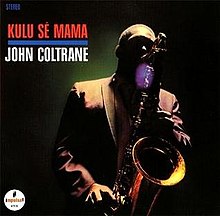Kulu Sé Mama
| Kulu Sé Mama | ||||
|---|---|---|---|---|
 | ||||
| Studio album by | ||||
| Released | January 1967[1] | |||
| Recorded | June 10 & 16, 1965 (#2-3, 5, 6) Van Gelder Studio, Englewood Cliffs October 14, 1965 (#1, 4) Western Recorders, Los Angeles | |||
| Genre | Avant-garde jazz, free jazz | |||
| Length | 34:15 original LP 69:33 CD reissue | |||
| Label | Impulse! A-9106 | |||
| Producer | Bob Thiele | |||
| John Coltrane chronology | ||||
| ||||
Kulu Sé Mama is an album by jazz musician John Coltrane. Recorded during 1965, it was released in early 1967 as Impulse! A-9106 (AS-9106 for the stereo version).
Background
The title piece and "Selflessness" were recorded in October 1965 and feature a large ensemble including Sanders, Garrett, Butler and Lewis. The other tracks, "Vigil", "Welcome" and "Dusk Dawn", feature the "classic quartet" (Coltrane, Jones, Garrison and Tyner). "Kulu Sé Mama" was composed by Juno Lewis, and the other titles are credited to Coltrane. "Selflessness" was first released on the posthumous album Selflessness: Featuring My Favorite Things, and "Dusk Dawn" was first released on the posthumous album Living Space. Kulu Sé Mama was the last album released during Coltrane's lifetime.
Reception
Scott Yanow of AllMusic commented "Lewis' chanting and colorful percussion make this a unique if not essential entry in Coltrane's discography".[2]
| Review scores | |
|---|---|
| Source | Rating |
| Allmusic | |
| Sputnikmusic | |
| The Rolling Stone Jazz Record Guide | |
Track listing
| No. | Title | Recording date | Length |
|---|---|---|---|
| 1. | "Kulu Sé Mama (Juno Sé Mama)" | October 14, 1965 | 18:50 |
| 2. | "Vigil" | June 16, 1965 | 9:51 |
| 3. | "Welcome" | June 10, 1965 | 5:34 |
| No. | Title | Recording date | Length |
|---|---|---|---|
| 4. | "Selflessness" | October 14, 1965 | 14:49 |
| 5. | "Dusk Dawn" | June 16, 1965 | 11:00 |
| 6. | "Dusk Dawn (Alternate Take)" | June 16, 1965 | 9:29 |
Personnel
- John Coltrane — tenor saxophone
- Pharoah Sanders — tenor saxophone, percussion (tracks 1, 4)
- McCoy Tyner — piano (#1, 3-6)
- Jimmy Garrison — double bass (#1, 3-6)
- Donald Rafael Garrett — clarinet,[nb 1] double bass, percussion (#1, 4)
- Frank Butler —drums, vocals (#1, 4)
- Elvin Jones — drums
- Juno Lewis — vocals, percussion, conch shell, hand drums (#1, 4)
Notes
- ^ The credits on the album jacket state that Garrett played bass clarinet on the recording. However, the authors of The John Coltrane Reference, who occasionally present updates to the book on their website (http://wildmusic-jazz.com/jcr_index.htm),[5] provided an update dated 2008 which states that Dutch musician Cornelis Hazevoet sent the following information via an email to author Yasuhiro Fujioka: "Over the years, in liners, books and lists, Don Garrett has been attributed with playing bass clarinet. This is wrong. The man only played bass and clarinet (the small and straight horn, that is)... In 1975, Garrett played in my band and I've specifically asked him about it (because I already felt something was wrong with it). He most specifically and pertinently told me that he never played bass clarinet in his entire life, only the small, straight horn (which he played in my band too)... Perhaps, the error originated from the fact that Garrett was listed somewhere as playing 'bass, clarinet', which subsequently evolved into 'bass clarinet'. Whatever is the case, Garrett did not play bass clarinet on any Coltrane record nor anywhere else."[6]
References
- ^ Billboard Jan 28, 1967
- ^ a b Yanow, Scott. Kulu Sé Mama at AllMusic
- ^ Campbell, Hernan M. (17 May 2012). "Review: John Coltrane - Kulu Se Mama | Sputnikmusic". sputnikmusic.com. Retrieved 10 April 2013.
- ^ Swenson, J., ed. (1985). The Rolling Stone Jazz Record Guide. USA: Random House/Rolling Stone. p. 47. ISBN 0-394-72643-X.
- ^ Porter, Lewis; DeVito, Chris; Fujioka, Yasuhiro; Wild, David; Schmaler, Wolf (2008). The John Coltrane Reference. Routledge. pp. x.
- ^ Porter, Lewis; DeVito, Chris; Fujioka, Yasuhiro; Wild, David; Schmaler, Wolf. "The John Coltrane Reference: 1965 Updates: Correction to session 65-0930". wildmusic-jazz.com. Retrieved July 12, 2020.
